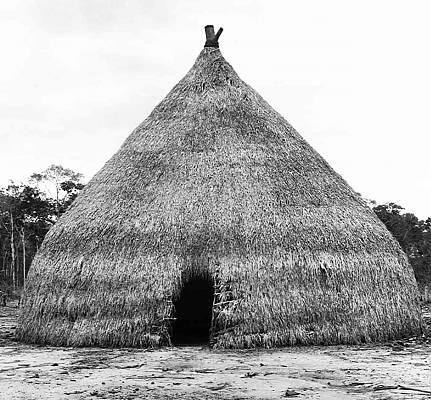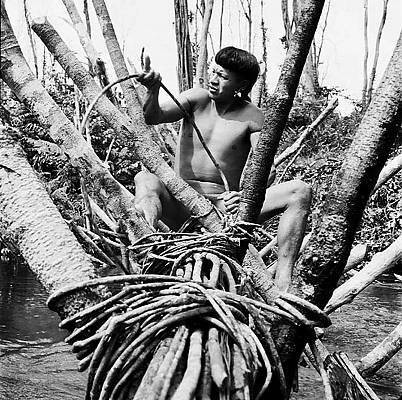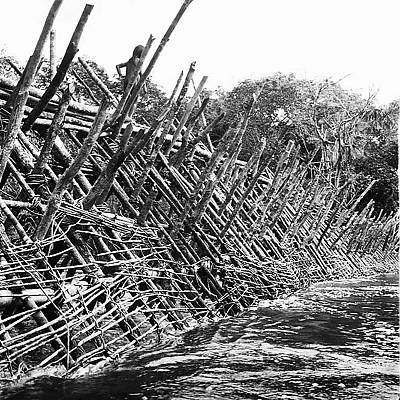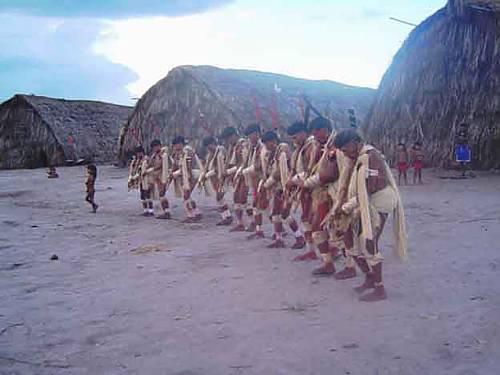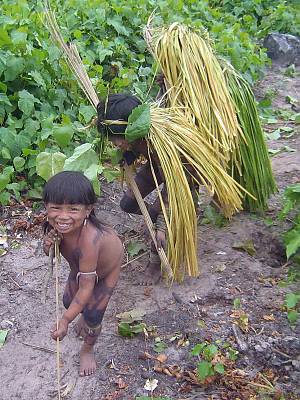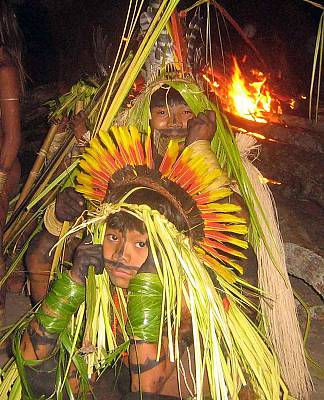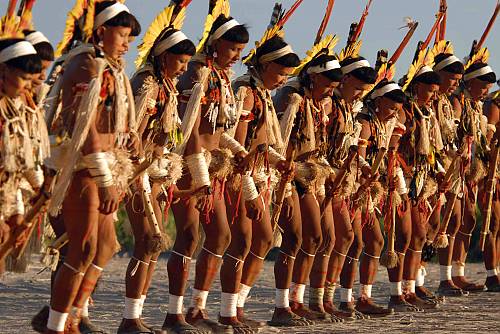Report on the status of an element inscribed on the list of intangible cultural heritage in need of urgent safeguarding
A. Cover sheet
A.1.
State Party
Name of State Party
Brazil
A.2.
Date of deposit of the instrument of ratification, acceptance, approval or accession
This information is available online.
Date of deposit of the instrument of ratification, acceptance, approval or accession
2006-03-01
A.3.
Element inscribed on the Urgent Safeguarding List that is the subject of this report
Name of element
Report of Brazil on the status of the element ‘Yaokwa, the Enawene Nawe people’s ritual for the maintenance of social and cosmic order’
Inscribed in
2016
Submitting State(s)
Brazil
A.4.
Reporting period covered by this report
Please indicate the period covered by this report.
A.5.
Other elements inscribed on the Urgent Safeguarding List, if any
Please list all other elements from your country inscribed on the Urgent Safeguarding List, together with the year of inscription; for multinational elements, please indicate the other States concerned.
A.6.
Executive summary of the report
Please provide an executive summary of the report that will allow general readers to understand the current status of the element, any positive or negative impacts of inscription, the implementation of safeguarding measures during the reporting period and their possible update for the following years.
A.7.
Contact person for correspondence
Provide the name, address and other contact information of the person responsible for correspondence concerning the report.
Title (Ms/Mr, etc.)
Family name
Given name
Institution/position
Address
Telephone number
E-mail address
Other relevant information
B. Status of element inscribed on the Urgent Safeguarding List
Refer to the nomination file or to previous reports, if any, as the basis for reporting on the current status of the element, and report only on relevant changes since the date of inscription on the List or since the previous report. Nomination files, specific timetables and earlier reports, if any, are available at https://ich.unesco.org or from the Secretariat, upon request.
The State Party shall pay special attention to the role of gender and shall endeavour to ensure the widest possible participation of the communities, groups and, where applicable, individuals concerned as well as relevant non-governmental organizations during the process of preparing this report, and is asked to describe how it has done so in point D below.
B.1.
Social and cultural functions
Please explain the social and cultural functions and meanings of the element today, within and for its community, the characteristics of the bearers and practitioners, and any specific roles or categories of persons with special responsibilities towards the element, among others. Attention should be given to any relevant changes related to inscription criterion U.1 (‘the element constitutes intangible cultural heritage as defined in Article 2 of the Convention’).
Social and cultural functions
The functions and social-cultural meanings of the Yaokwa Ritual as a celebration remain the same for the Enawenê Nawê people, serving as a marker of the group's existence. Unlike other celebrations known for their festive nature, this ceremony maintains the strict obligation to appease their gods/spirits by offering them large quantities of food and uninterrupted ancestral chants. In return, the gods/spirits are expected to maintain order and prevent misfortune. The only contextual change related to the ritual's execution is the acquisition of food and other resources in nearby cities to supplement what cannot be fully obtained from the Indigenous Territory.
It has been observed that traditional knowledge transmission methods have seen some innovations, such as the recording of videos by the Enawenê Nawê themselves during the Yaokwa Ritual.
The Yaokwa Ritual is considered the main ceremony in the complex ritual calendar of the Enawenê Nawê, an Arawak-speaking indigenous people whose traditional territory and Indigenous Land are located in the northwest region of the state of Mato Grosso. Lasting between seven and eight months, this ritual marks the beginning of the Enawenê annual calendar when men embark on collective dam fishing. The Yaokwa Ritual extends throughout the dry season, a time marked by interactions with the feared natural beings from the underground level, the Yakairiti. From the native perspective, these beings are condemned to live with insatiable hunger
and rely on the Enawenê Nawê to satisfy their voracious hunger for vegetable salt, fish, and other foods derived from corn and cassava. Thus, the Enawenê Nawê must establish a constant exchange relationship with these spirits to maintain social and cosmic order, exchanges that occur
through a complex ritual cycle distributed throughout the year.
For the execution of this ritual, the Enawenê Nawê people are divided between the Harikare and the Yaokwa, according to the clans that organize their society. The Harikare are the hosts,responsible for organizing the ritual and staying in the village with the women, preparing vegetable salt, tending to the fire, offering food, and cleaning the courtyard and paths. On the other hand, the Yaokwa are the fishermen who embark on expeditions to accumulate a large quantity of smoked fish and then return to the village to offer the catch to the Yakairiti. The Yaokwa Ritual also encompasses a repertoire of oral traditions, dances, songs, instruments, and other traditional knowledge.
Regarding broader social and cultural aspects of the Enawenê Nawê people, especially related to gender issues, it is noted that in the last four years, women have begun to gain space in public policy activities predominantly dominated by men. For example, women have mobilized and achieved: the implementation of the Youth and Adult Education (EJA) program by the State Secretariat of Education of Mato Grosso (SEDUC-MT) aimed at the literacy of Enawenero women in Portuguese as a second language, and the selection of a project for funding by the State Secretariat of Culture, Sports, and Leisure of Mato Grosso (SECEL-MT) highlighting traditional foods and handicrafts produced by women.
B.2.
Assessment of its viability and current risks
Please describe the current level of viability of the element, particularly the frequency and extent of its practice, the strength of traditional modes of transmission, the demographics of practitioners and audiences and its sustainability. Please also identify and describe the threats, if any, to the element's continued transmission and enactment and describe the severity and immediacy of such threats, giving particular attention to any strengthening or weakening of the element’s viability subsequent to inscription.
Assessment of its viability and current risks
Between 2019 and 2022, changed political guidelines required an adaptation in the management of Brazil's Intangible Cultural Heritage. In scenarios of budgetary constraints for the cultural sector and the impossibility of holding in-person meetings during the COVID-19 pandemic (especially in indigenous communities), the work of Iphan became even more challenging in the administration of safeguarding processes, including the Yaokwa Ritual’s.
However, as mentioned in question A6, even without permanent Iphan’s participation in safeguarding actions for the protection and promotion of the Yaokwa Ritual, the Enawenê Nawê people demonstrated the ability to articulate other partnerships for cultural projects aimed at safeguarding their cultural heritage. These projects will be duly listed in the questions below. This gain in social mobilization and interinstitutional coordination by the bearers can be partly justified by safeguarding and educational actions carried out by Iphan between 2012 and 2018 with the community, as indicated in the book "Saberes, Fazeres, Gingas e Celebrações," available at: http://portal.iphan.gov.br/uploads/publicacao/sfgec.pdf, pages 196-201.
As reported by the community, both in the 2021 technical visit and the 2023 technical visit, the Yaokwa Ritual continues to occur annually, respecting the community's ritualistic calendar, maintaining the same meanings and values for the Enawenê Nawê people. In this sense, the beliefs and knowledge crucial to the cultural element continue to be transmitted to younger generations.
Regarding threats to the continuity of the Yaokwa Ritual, the previous report pointed out that a drastic reduction in the quantity of fish directly impacts fishing and, consequently, the practice of the cultural element. Currently, the Indigenous Territory region continues to suffer from the reduction of natural resources, especially food and raw materials necessary for the ritual. As indicated in question A6, the main causes are associated with the expansion of agribusiness with a significant increase in livestock farming and agriculture on an industrial scale, as well as the installation of hydroelectric developments on the rivers surrounding the Indigenous Territory. However, influenced by relationships with non-indigenous people, new habits, and the need to keep their ritual traditions alive, the Enawenê Nawê people have started acquiring food and other resources for rituals in nearby cities, complementing what cannot be fully extracted from the Indigenous Territory, ensuring the realization of rituals and, consequently, their cultural meanings.
B.3.
Implementation of safeguarding measures
Please report on the safeguarding measures described in the nomination file, and previous report, if any. Describe how they have been implemented and how they have substantially contributed to the safeguarding of the element during the reporting period, taking note of external or internal constraints such as limited resources. Include, in particular, information on the measures taken to ensure the viability of the element by enabling the community to continue to practise and transmit it. Include the following detailed information concerning the implementation of the set of safeguarding measures or safeguarding plan:
B.3.a.
Objectives and results
Indicate what primary objective(s) were addressed and what concrete results were attained during the reporting period.
Objectives and results
The delivery of publications to Aldeia Halataikwa aimed at returning to local leaders and the community the results of the research conducted on the Yaokwa Ritual and the Salomã. The dissemination of the produced material is in line with the ongoing requests of the Enawenê Nawê People to document their rituals and to emphasize their cultural heritage as a feature of Brazil’s cultural identity. The promotion of publications through the distribution to external agents, such as public institutions in the cities surrounding the villages, played a crucial role in fighting the prejudice of non-indigenous people regarding the Enawenê Nawê way of life. The production of knowledge about Enawenê Nawê culture through publications is an important vector for creating a relationship of mutual respect between the indigenous people and non-indigenous groups in the surrounding cities.
The safeguarding actions for which financial resources were raised autonomously by the Enawenê Nawê included:
a) DGM/BRASIL: Edital nº 2 - Propostas selecionadas em 2018, available at: https://dgmbrasil.org.br/media/publicacoes/propostas_aprovadas2018.pdf - the action
"Enrichment of yards with fruit seedlings," represented by the Ethnocultural Association Enawenê Nawê, contributed to ensuring the long-term production of fruits consumed during the rituals that make up the group's calendar;
b) 2nd Edition of the BNDES Award for Good Practices for Traditional Agricultural Systems (SATs) - the received funds were used to purchase part of the offerings presented to the spirits during the ritual celebration. Both resources were applied with the purpose of ensuring the preservation of the Yaokwa Ritual.
B.3.b.
Safeguarding activities
List the key activities that were carried out during this reporting period in order to achieve these expected results. Please describe the activities in detail and note their effectiveness or any problems encountered in implementing them.
Safeguarding activities
In 2021, Iphan conducted a technical mission with a view to: supporting the administrative process for the reassessment of the element for the revalidation of the title of Cultural Heritage of Brazil attributed to the Yaokwa Ritual of the Enawenê Nawê people, as established by Iphan Resolution No. 5, from 12 July 2019; initiating the development of the Safeguarding Plan for the Yaokwa Ritual; and launching and distributing, within the bearer community, the publications "Ritual Yaokwa of the Enawene Nawe People" and "Salomã – Enore Nawe Deta," both edited by Iphan and available respectively at:
and
.
In 2023, Iphan reinstated its political guidelines on the management of Brazil's Intangible Cultural Heritage and resumed dialogues on safeguarding with the Enawenê Nawê People. In October, Iphan conducted workshops with indigenous teachers, leaders, chant masters (Sotakatari Nawe), and Enawenero women to finalize the safeguarding plan initiated in 2021. Additionally, a pilot project on the transmission of knowledge between Sotakatari Nawê and teenagers from the Enawenê Nawê indigenous school was implemented, covering topics related to cosmology, history, geography, and traditional knowledge associated with Enawenê Nawê culture.
Despite Iphan's detachment between 2019 and 2022, the owning community remained active in dialogues with various governmental and non-governmental entities, seeking support for the maintenance or development of projects aimed at preserving their heritage. Some of these projects, relevant to the safeguarding of the Yaokwa Ritual, were identified during the 2023 technical visit to the bearer community:
- Since 2019, the National Indigenous Peoples Foundation (FUNAI) has been implementing a management plan for Buriti palms in springs within the Indigenous Territory and near ancient villages of the Enawenê Nawê people. Buriti palms are extensively used by the group for constructing architectural coverings, ritualistic attire, and various artifacts. In 2020, this project involved the purchase of Buriti palm seedlings for replanting, and in 2023, the establishment of a nursery for seedling production in the vicinity of the Kotakowinakwa and Dolowikwa villages.
- In 2021, the second edition of the "BNDES Award for Good Practices for Traditional Agricultural Systems" recognized two exemplary actions related to the safeguarding of the intangible cultural heritage of the Enawenê Nawê people, focusing on the conservation and dynamics of traditional agricultural systems. The awarded projects were "Ikioakakwa – Traditional Plot for the Yaokwa Ritual," submitted by the Ethnocultural Indigenous Association Enawenê Nawê, and "Cultivation
of Bitter Manioc – Ketekwa," proposed by the Indigenous Association Enawenê Nawê. Available at:
- As mentioned earlier, to ensure an adequate supply of food during rituals, items not entirely obtained from the Indigenous Territory are supplemented by purchasing products in nearby cities. Currently, funding sources are associated with compensation agreements (TAC) through which Small Hydroelectric Power Plants (SHPs) near the Indigenous Territory are obliged to compensate the Enawenê Nawê people for the damages caused by the SHPs to their way of life. Additionally, a small portion of the revenue from the Ecological Tax on Circulation of Goods and Services (ICMS Ecológico), received by municipalities within the Indigenous Territory from the state of Mato Grosso, is allocated to the Enawenê Nawê people through their associations. Other governmental and non-governmental institutions, such as the Coordination of Indigenous Organizations of the Brazilian Amazon (COIAB), the Indigenous Missionary Council (CIMI), the Native Amazon Operation (OPAN), the National Indigenous Peoples Foundation (FUNAI), among others, also contributed to the realization of the rituals between 2019 and 2023.
- In recent years, Enawenero women mobilized the Department of Education of the state of Mato Grosso (SEDUC-MT) to implement the Youth and Adult Education (EJA) program aimed at the literacy of Enawenero women in Portuguese as a second language. Additionally, a project was approved for funding from the Secretariat of Culture, Sports, and Leisure of the State of Mato Grosso (SECEL-MT) that highlights traditional foods and crafts produced by women.
- In 2022, the Secretariat of Culture, Sports, and Leisure of the State of Mato Grosso (SECEL/MT) conducted a public selection called "Living Culture," which selected three projects from the Enawenê Nawê people, all related to their culture and way of life: (a) A feminine perspective on life in the Enawenê Nawê village; (b) Meetings: heritage and society in Mato Grosso, (c) Project Kataheiro. Available at: .
- Autonomous safeguarding initiatives were also observed. Young filmmaker Wayali Wesley Enawenê produces a series of videos, documentaries, and films showcasing Enawenê Nawê culture and depicting the community's ritual routines. The majority of this content is available on his YouTube channel: . In 2020, three of his works were exhibited at cultural festivals in Brasília/DF and São Paulo/SP. In 2021, during the
COVID-19 pandemic, participation in an international project allowed an investment of R$ 2,500 (approx. US$ 500) in pedagogical materials for use in the village school, leading to the publication of the book "From Corsica to Mato Grosso," by the publisher Hervé Cheuzeville, in the same year. Wesley also had a project selected by the World Bank, and the R$98,000 (approx. US$ 20.000) grant will be used to invest in new equipment and expand internet access in the village. Wesley will compete with his productions at upcoming cultural festivals in Rio de Janeiro and the state of
Bahia.
B.3.c.
Participation of communities, groups or individuals in the safeguarding activities
Describe how communities, groups or, if appropriate, individuals as well as relevant non-governmental organizations have effectively participated, including in terms of gender roles, in the safeguarding measures. Describe the role of the implementing organization or body (name, background, etc.) and the human resources that were available for implementing safeguarding activities.
Participation of communities, groups or individuals in the safeguarding activities
Among the agents, governmental and non-governmental organizations and institutions that actively participated in the safeguarding measures listed in this report, the following stand out: heritage professionals from the Superintendence of Iphan/MT and the Department of Intangible Heritage (DPI) of Iphan; educators from the Regional Directorate of Education in Juína, linked to the Department of Education of Mato Grosso (DRE/Juína - SEDUC/MT), who work in formal education for young people in the Enawenê Nawê villages; the National Foundation of Indigenous Peoples (FUNAI); the Enawenê Nawê Ethnocultural Association; the Indigenous Missionary Council (CIMI/Cuiabá) through indigenist Fausto Campoli; the chant masters (sotakatali, guardians of knowledge related to the Yaokwa Ritual); and indigenous students and teachers from the schools in the Enawenê Nawê villages.
The way each public agency or institution contributed to safeguarding measures is directly linked to its institutional field of action, reinforcing the importance of intersectoral coordination in conducting transversal safeguarding actions that require integration in the fields of culture, education, environment, tourism, health, social development, etc.
Regarding gender roles, it was observed that, in the safeguarding actions from 2019 to 2022, the participation of women focused on the private and care spheres (domestic and family), such as taking care of children and the elderly in the villages and preparing food offered to the spirits. In the latter case, the traditional knowledge of Enawenero women about food preparation plays a vital role in maintaining the Yaokwa Ritual and other celebrations that are part of the group's ritual calendar.
B.3.d.
Timetable
Indicate in a timetable when each activity was implemented.
Timetable
2019 – FUNAI initiates the project for the management plan of buriti, a plant species extensively used by the Enawenê Nawê for architectural constructions, clothing, ornaments, rituals, and the creation of various artifacts. It is important to note that the action was not prompted by the imminent extinction of buriti in the group's territory. The fact is that the concentration of buriti is distant from the villages, requiring complex logistics for the collection of leaves and fruits. In this regard, the consultancy hired by FUNAI - from the Forestry Engineering department of the Federal University of Mato Grosso - found that the management plan will enhance the availability of the species for the group in the long term, facilitating their access.
2020 – FUNAI acquired buriti seedlings as part of the management plan, with the aim of planting them near the rivers' sources close to the villages. The project includes the participation of various indigenous individuals in planting, maintenance, and monitoring the development of the seedlings.
2021 – Launch and distribution, to local leaders and the community, of the books "Salomã - Enore Nawê Deta" and "Dossiê de Registro do Ritual Yaokwa do Povo Enewenê Nawê," as described in item B3.
2021 – Technical visit to the bearer community to consult them about their interest in revalidating the title of Cultural Heritage of Brazil, through the reevaluation process of the cultural element. During this occasion, the community was also consulted to express their views on the importance of maintaining the title, the relevance of the safeguarding actions carried out so far, and to provide suggestions for other necessary actions for the continuity of the Yaokwa Ritual.
2021 – Commencement of mobilization for the elaboration of the Safeguarding Plan for the Yaokwa Ritual, with the involvement of the bearer community.
2021 – The "2nd BNDES Award for Good Practices for Traditional Agricultural Systems" honored two exemplary actions for safeguarding the intangible cultural heritage of the Enawenê Nawê people.
2022 – The State Secretariat of Culture, Sports, and Leisure of the state of Mato Grosso
(SECEL/MT) carried out a public selection called "Viver Cultura," selecting three projects from the Enawenê Nawê people.
2023 – Completion of the elaboration of the Safeguarding Plan for the Yaokwa Ritual, with the participation of the bearer community, including Enawenero women in one of the sessions.
2023 – Implementation of a pilot project on the knowledge transmission from the Sotakatari Nawê (chant masters) to Enawenê high school students and teachers about their origins, culture, and traditional knowledge.
2023 – FUNAI initiates the execution of the nursery for planting buriti seedlings, as part of the management plan, with the involvement of some representatives from the villages in the maintenance/care of the elements.
B.3.e.
Budget expenditures
Provide the detailed amounts of the funds used for the implementation of each activity (if possible, in US dollars), identifying the funding source for each (governmental sources, in-kind community inputs, etc.).
Budget
As mentioned earlier, between the years 2019 and 2022, new political guidelines led to an adaptation in the management of Brazil's Intangible Cultural Heritage. In scenarios of budgetary resource constraints for the cultural sector and the impossibility of holding in-person meetings during the COVID-19 pandemic, the work of Iphan became even more challenging in guiding the safeguarding of the Yaokwa Ritual. However, thanks to the support of institutional partners and the Enawenê Nawê people's ability to seek alternative forms of support, it was possible to receive investments from other sources. The majority of the safeguarding actions listed in the response to question B3.B involved some budgetary investment from the partner that implemented the project.
BNDES awarded the project "Ikioakakwa: Traditional Field for the Yaokwa Ritual" with
R$ 50,000.00 (approximately US$ 10,139.93) through the 2nd BNDES Award for Good Practices for Traditional Agricultural Systems.
SECEL-MT invested R$ 90,000.00 (approximately US$ 18,251.88) in three projects of the
Enawenê Nawê people: "A Feminine Perspective on Life in the Enawenê Nawê Village,"
"Encounters – Heritage and Society in Mato Grosso," and "Kataheiro Project" through the Viver Cultura 2022 Call for Proposals.
Between 2021 and 2023, Iphan invested R$ 13,433.91 (approximately US$ 2,765.14) in technical visits to the villages, aiming to reevaluate the cultural element for the revalidation of the Title of Cultural Heritage of Brazil and to develop the Safeguarding Plan for the Yaokwa Ritual.
Funai invested approximately R$ 900,000.00 (approximately US$ 181,932.12) in actions for the recovery of native vegetation in 40 Indigenous Lands located in various Brazilian biomes. Among the actions was the acquisition of about 4 thousand seedlings of native species, such as buriti, to be planted in Indigenous Territories, including that of the Enawenê Nawê people.
B.3.f.
Overall effectiveness of the safeguarding activities
Provide an overall assessment of the effectiveness of the activities undertaken to achieve the expected results and of the efficiency of the use of funds for implementing the activities. Please indicate how the activities contributed to achieving the results and whether other activities could have contributed better to achieving the same results. Also indicate whether the same results could have been achieved with less funding, whether the human resources available were appropriate and whether communities, groups and individuals could have been better involved.
Overall effectiveness of the safeguarding activities
To understand the effectiveness of the activities undertaken to achieve the expected results and the efficiency of the use of funds for implementing the activities it is importante to remember the challenges related to budgetary constraints in the cultural sector in Brazil between 2019 and 2022.
Two books were published by Iphan ("Ritual Yaokwa do Povo Enawene Nawe" and "Salomã – Enore Nawe Deta"), as promotional actions, aimed at the extensive dissemination of the cultural element, both for the bearer community and for a broader audience (educational and cultural institutions around the villages, public managers, and entities related to the indigenous cause). This acionts were crucial for strengthening safeguarding efforts.
For the bearer community, the actions contributed to the strengthening and empowerment of individuals in terms of self-valuation of their culture (self-esteem) and the documentation of their experiences so that others could learn about the ways of life of the Enawenê Nawê people. In the case of teachers, the material is used as a teaching resource to support lessons on Indigenous Culture. Beyond the publications, the technical visits conducted in 2021 and 2023 contributed, on one hand, to the heritage agents’ understanding the group's ways of life (habits, customs, on-site observation of celebration rituals, etc.) and, on the other hand, to the construction of the field of action necessary for anthropology professionals and their collaborators in the research and dialogue process. In this sense, the visits were important to reinforce the limits and scope of Iphan's registered element safeguarding policy.
Regarding actions whose financial resources were accessed autonomously through representative entities of the villages (Ethnocultural Association), it is known that all the financial resource obtained was directly and indirectly invested in the maintenance of the Enawenê Nawê people's cultural heritage. It is emphasized that the actions aimed at widespread dissemination to promote the group's culture, especially the Yaokwa Ritual, surpassed the boundaries of the villages, the state, and even the country. An example is the audiovisual and written production by the young filmmaker Wesley Enawenê. The execution of all these actions, converging towards the appreciation, dissemination, and promotion of the cultural element despite having low financial resources, managed to achieve significant results thanks to the commitment and dedication of Iphan agents, the bearer community themselves, and partner institutions. It is a fact that with fewer resources (financial and human), the results achieved would not have been the same, falling below expectations.
C. Update of the safeguarding measures
C.1.
Updated safeguarding plan
Please provide an update of the safeguarding plan included in the nomination file or in the previous report. In particular provide detailed information as follows:
- a. What primary objective(s) will be addressed and what concrete results will be expected?
- b. What are the key activities to be carried out in order to achieve these expected results? Describe the activities in detail and in their best sequence, addressing their feasibility.
- c. How will the State(s) Party(ies) concerned support the implementation of the updated safeguarding plan?
Updated safeguarding plan
In the previous periodic report, seven safeguarding actions were presented:
1. Launch event for the books "Dossiê de Registro Ritual Yaokwa" and "Salomã – Enore Nawe Deta" (Salomã – Celestial Spirits).
2. Distribution of the books in the villages of the Enawenê Nawê people.
3. Creation and provision of a virtual space for the dissemination of a digital collection containing the documentary and audiovisual productions of the Enawenê Nawê.
4. Implementation of exchange actions with other indigenous ethnicities through coordination with the Rondon Museum of the Federal University of Mato Grosso.
5. Organization of itinerant exhibitions on Enawenê Nawê culture in various spaces.
6. Development of an exhibition project for a permanent display at the Ikuiapá Museum in Cuiabá, Mato Grosso.
7. Conception of a Cultural Reference Center for the Enawenê Nawê Indigenous People in Cuiabá, Mato Grosso.
Of these, the first three were executed. The launch (1) and distribution (2) of the books "Dossiê de Registro Ritual Yaokwa" and "Salomã – Enore Nawe Deta" took place during the 2021 technical visit, along with the reassessment of the cultural element for the revalidation process. The material produced by Iphan related to the Yaokwa Ritual is available for public consultation (3) on Iphan’s website (bcr.iphan.gov.br). The main results of these three actions are linked to meeting the Enawenê Nawê people's demand to document the Yaokwa and Salomã rituals, without prejudicing future additions if the community deems it necessary.
The other actions could not be executed due to two factors: first, COVID-19 made it challenging to carry out any in-person activities involving the gathering of people, especially indigenous communities; and second, budgetary constraints in the national cultural sector between 2019 and 2022 prevented the implementation of projects requiring larger financial resources. The Ikauipá Museum, for example, an institution linked to FUNAI, is located in the capital Cuiabá and has remained closed for renovations.
In October 2023, Iphan successfully finalized the Yaokwa Ritual Safeguarding Plan with the Enawenê Nawê people. Although the produced material is still in the consolidation and review phase, there is an expectation that the publication of the Safeguarding Plan will occur in the first semester of 2024.
The Yaokwa Ritual Safeguarding Plan is a participatory document or agreement of intentions constructed with the Enawenê Nawê people, involving local partners who can and want to contribute to the safeguarding of the cultural element. The document brings together a set of safeguarding actions aimed at strengthening, protecting, disseminating, and valuing the Yaokwa Ritual and the knowledge, customs, and rituals associated with the cultural practice. The bearer community agreed that the Safeguarding Plan will have a duration of nine years and organized the actions into three priority groups: high, medium, and low. High-priority actions should preferably be carried out in the first triennium, followed by medium and low priorities for the second and third triennia, respectively.
C.2.
Timetable for future actitivies
Provide a timetable for the updated safeguarding plan (within a time-frame of approximately four years).
00521
Timetable
During the Safeguarding Plan development workshop, the bearer community established sixteen high-priority actions, but a detailed annual schedule was not defined. The execution order will be determined year by year in collaboration with the bearer community and local partners. The planned actions for the next four years include:
1. Encourage the register of bearers as artisans in the state of Mato Grosso;
2. Conduct periodic workshops on the Policy for the Safeguarding of Intangible Heritage for bearers and institutional partners;
3. Foster dialogue with other institutions on strengthening the Policy for the Safeguarding of Intangible Heritage;
4. Seek partnerships to expand the implementation of management plans for plant species that are a source of necessary resources for ritual maintenance;
5. Promote the production of bilingual materials (Portuguese and Arawak);
6. Map the cosmology and origin narratives of the Enawenê Nawê people;
7. Map the dwelling places of spirits and organize visits for younger individuals;
8. Hold exhibitions on Enawenê Nawê culture;
9. Support the production of bilingual educational material (Portuguese and Arawak);
10. Train teachers in participatory inventories;
11. Conduct workshops for the development of projects for cultural grant submissions;
12. Conduct workshops for the accountability of cultural projects selected through grants;
13. Organize or support workshops for the transmission of knowledge on the production of Enawenê Nawê handicrafts, with a focus on women's participation;
14. Document traditional knowledge associated with the ritualistic ensemble of the Enawenê Nawê people through audiovisual recordings;
15. Document the four rituals that constitute the ritualistic ensemble of the Enawenê Nawê people (Yaokwa, Salomã, Kateoko, and Derohi);
16. Document the chanting of clans and rituals.
It is noteworthy that among the listed Safeguarding Plan actions, there is an interest from the Enawenê Nawê people to remove the Yaokwa Ritual from the List of Intangible Cultural Heritage requiring urgent safeguarding measures. The document is in its final consolidation phase and is scheduled to be published in the first semester of 2024.
C.3.
Budget for future activities
Provide the estimates of the funds required for implementing the updated safeguarding plan (if possible, in US dollars), identifying any available resources (governmental sources, in-kind community inputs, etc.).
Budget
The budgetary resources available for the protection of the National Intangible Cultural Heritage come from the federal government. The Ministry of Culture (MinC) is the federal institution responsible for managing the budget invested in national culture. Linked to MinC, Iphan is the federal autonomous institution responsible for the protection of the National Intangible Cultural Heritage.
The budgetary resources allocated to Iphan for the implementation of safeguarding actions for the Intangible Cultural Heritage (ICH) utilize the budget program "5025 – Culture" and the budgetary action "20ZH – Preservation of Brazilian Cultural Heritage." Eventually, other governmental or non-governmental sources of funding may be incorporated through specific subsequent projects, agreements, partnerships, or intersectoral collaborations.
Over the next four years, approximately $20,000 per year (a total of $80,000 over the next 4 years) may be made available for the execution of safeguarding actions related to the Yaokwa Ritual of the Enawenê Nawê People.
At this moment, it is not possible to determine how the financial resources will be spent, as the projects need to be detailed in conjunction with the leaders of the Enawenê Nawê People. It is important to note that some projects also depend on integration with other levels of government and civil society organizations, requiring preliminary inter-institutional coordination and the negotiation of work plans.
C.4.
Community participation
Please describe how communities, groups and individuals, as well as relevant non-governmental organizations have been involved, including in terms of gender roles, in updating the safeguarding plan, and how they will be involved in its implementation.
00033
Community participation
FUNAI and the teaching staff of the village school provided the necessary support (logistical, pedagogical, mobilization) for the meetings. Indigenous leaders (chant masters, chiefs, and shamans), high school students, and teachers actively attended all sessions. The Ethnocultural Association, through its president, played a crucial role in facilitating translation. Although many potential public and private institutions for partnership were not present at the meetings, the Artisan Coordination of the State Development Secretariat of Mato Grosso (SEDEC/MT) committed to producing artisan ID cards for Enawenê Nawê artisans.
The participation of indigenous teachers who completed the Teaching Course (High School) in 2020, serving as interpreters and assisting Iphan’s team during the meetings for the elaboration of the Plan, was crucial. Up until now, we depended solely on the support of the indigenist from the Indigenous Missionary Council (CIMI/Cuiabá), Fausto Campoli, in the translation process between the Arawak language and Portuguese. With the increasing ownership of teachers regarding the safeguarding of cultural heritage, the possibility of closer dialogues with the community is quite positive.
Another important aspect observed during the activities for the construction of the Plan was the participation of women in discussions about future safeguarding actions. Despite the gaze of male leaders, authorized by the social structure of the Jê tradition, the Enawenero women contributed by engaging in activities related to documenting unused domestic utensils (clay pots, tucum nut strainers, etc.), pricing workshops for artisanal pieces like hammocks, and mapping traditional foods. It is highly likely that the planned actions related to audiovisual production and research for the documentation of the Takeokô and Dehori rituals will involve the participation of community teachers and students.
C.5.
Institutional context
Please report on the institutional context for the local management and safeguarding of the element inscribed on the Urgent Safeguarding List, including:
- a. the competent body(ies) involved in its management and/or safeguarding;
- b. the organization(s) of the community or group concerned with the element and its safeguarding.
2006-03-01
Institutional context
Iphan is a federal institution under the Brazilian Ministry of Culture that has been in charge of the preservation of national heritage since 1937. It has a nationwide presence through its superintendencies.
The promulgation of the Presidential Decree No. 3,551/2000, which established the Register of Intangible Cultural Heritage and created the National Program of Intangible Heritage (PNPI), assigned to Iphan the responsibility for the management and safeguarding of intangible cultural heritage at the national level.
In addition to Iphan, other organizations and institutions concerned with safeguarding the Yaokwa Ritual include: the National Indigenous Peoples Foundation (FUNAI); Department of Education of Mato Grosso (SEDUC/MT); Regional Directorate of Education of Juína (DRE-Juína); Ethnocultural Association Enawenê Nawê; the Indigenous Missionary Council (CIMI/Cuiabá); State Secretariat of Culture, Sports, and Leisure of the state of Mato Grosso (SECEL/MT); Federal University of Mato Grosso (UFMT); Operation Native Amazon (OPAN); Museum of Indigenous Peoples; and the State Secretariat of the Environment (SEMA/MT).
D. Participation of communities in preparing this report
Describe the measures taken to ensure the widest possible participation of the communities, groups and, where applicable, individuals concerned as well as relevant non-governmental organizations during the process of preparing this report.
Participation of communities in preparing this report
The technical visits conducted by Iphan in 2021 and 2023 primarily aimed at listening to the Yaokwa Ritual bearer community, seeking insights into the maintenance of the ritual and potential changes that have occurred in recent years. The visits also assessed how the Enawenê Nawê People have been transmitting knowledge related to the cultural element.
The 2021 visit resulted in the reevaluation report of the cultural heritage for the revalidation of the title of Cultural Heritage of Brazil for the Yaoka Ritual, as established by Iphan Resolution No. 5, dated July 12, 2019.
During the technical visit in October 2023, following the discussions with the bearer community, the Safeguarding Plan for the Yaokwa Ritual was finalized. This document was collaboratively developed, listing safeguarding actions with varying degrees of priority and proposing an execution plan for the next nine years. The document is currently in the final consolidation phase and is scheduled to be published in the first semester of 2024.
E. Signature on behalf of the State Party
The report should be signed by an official empowered to do so on behalf of the State, and should include his or her name, title and the date of submission.
Name
Leandro Antônio Grass Peixoto
Title
President of National Institute of Historic and Artistic Heritage (Iphan)
Date
14-12-2023
Signature
Leandro Grass
Upload signed version in PDF

